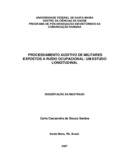| dc.creator | Santos, Carla Cassandra de Souza | |
| dc.date.accessioned | 2007-09-19 | |
| dc.date.available | 2007-09-19 | |
| dc.date.issued | 2007-07-06 | |
| dc.identifier.citation | SANTOS, Carla Cassandra de Souza. Auditory processing of military personnel exposed to
occupational noise: a longitudinal study. 2007. 92 f. Dissertação (Mestrado em Fonoaudiologia) - Universidade Federal de Santa Maria, Santa Maria, 2007. | por |
| dc.identifier.uri | http://repositorio.ufsm.br/handle/1/6603 | |
| dc.description.abstract | The hearing evaluation that has been doing on occupational environment easily detects the noise induced hearing loss (NIHL), however, alterations on the central auditory pathway can not be observed. Studies have showed a relation between the noise exposure time and the increase of the incidence of hearing loss, but do not demonstrate how the auditory processing can be affected by the exposure time of that risk. Therefore, this study had as objective to evaluate the influence of working time on the central auditory function of military personnel exposed to occupational noise. It were evaluated 41 militaries, with at least 10 years of noise
exposure, divided into group A (n = 16), without hearing loss and group B (n = 25), with hearing loss. To configure a longitudinal study, were invited the same individuals studied by Marins (2004) and were submitted to the same evaluations three years after the referred study: basic hearing evaluation and auditory processing tests (Low- Pass Filtered Speech, SSW and Pitch Pattern Sequence - PPS tests). A higher
occurrence of auditory processing alterations were observed, specially on Low-Pass Filtered Speech test (43,75% and 68% on groups A and B, respectively) and PPS (68,75% and 48% on groups A and B, respectively). Longitudinally, statistical
analysis revealed a significant decrease of Speech ecognition Index, just in the group B, in both ears; on the Low-Pass Filtered Speech test of group B (right and left ears) and just in the left ear of group A. Then, it was concluded that the occupational noise exposure interferes on the auditory processing of military personnel, and that increase with the working time | eng |
| dc.format | application/pdf | por |
| dc.language | por | por |
| dc.publisher | Universidade Federal de Santa Maria | por |
| dc.rights | Acesso Aberto | por |
| dc.subject | Audição | por |
| dc.subject | Processamento auditivo | por |
| dc.subject | Perda auditiva | por |
| dc.subject | Hearing | eng |
| dc.subject | Auditory processing | eng |
| dc.subject | Hearing loss | eng |
| dc.title | Processamento auditivo de militares expostos a ruído ocupacional: um estudo longitudinal | por |
| dc.title.alternative | Auditory processing of military personnel exposed to
occupational noise: a longitudinal study | eng |
| dc.type | Dissertação | por |
| dc.description.resumo | A avaliação auditiva prevista para ambientes ocupacionais facilmente detecta a perda auditiva induzida por ruído (PAIR), porém, alterações da via auditiva central não podem ser observadas. Alguns estudos têm mostrado uma relação entre o
tempo de exposição a ruído e o aumento da incidência da perda auditiva, mas não demonstra o quanto o processamento auditivo pode ser afetado pelo tempo de exposição a tal risco. Assim, este trabalho teve como objetivo avaliar a influência do
tempo de serviço na função auditiva central de militares expostos a ruído ocupacional. Foram avaliados 41 militares, com exposição a ruído a mais de 10 anos, subdivididos em grupo A (n =16), sem perda auditiva e grupo B (n = 25), com
perda auditiva. Para configurar um estudo longitudinal, foram convidados os mesmos indivíduos estudados por Marins (2004) e todos foram submetidos às mesmas avaliações três anos depois do referido estudo: avaliação audiológica básica e testes de processamento auditivo (testes de Fala Filtrada, SSW e de Padrão de Freqüência - PPS). Foram observadas maiores ocorrências de alteração de processamento auditivo, especialmente no teste de Fala Filtrada (43,75% e 68% nos grupos A e B, respectivamente) e PPS (68,75% e 48% nos grupos A e B, respectivamente). Longitudinalmente, observou-se piora estatisticamente significante no Índice Percentual de Reconhecimento de Fala (IPRF) apenas no grupo B, em ambas as orelhas; no teste de Fala Filtrada no grupo B (orelha direita e esquerda) e apenas da orelha esquerda do grupo A. Com isto, conclui-se que a exposição a ruído ocupacional interfere no processamento auditivo de militares, sendo agravado pelo
aumento do tempo de serviço | por |
| dc.contributor.advisor1 | Rossi, Angela Garcia | |
| dc.contributor.advisor1Lattes | http://lattes.cnpq.br/2855158417172905 | por |
| dc.contributor.referee1 | Juchem, Luiza de Salles | |
| dc.contributor.referee1Lattes | http://lattes.cnpq.br/0188695294021427 | por |
| dc.contributor.referee2 | Mezzomo, Carolina Lisbôa | |
| dc.contributor.referee2Lattes | http://lattes.cnpq.br/3084638267716841 | por |
| dc.contributor.referee3 | Tochetto, Tania Maria | |
| dc.contributor.referee3Lattes | http://lattes.cnpq.br/8143803500058249 | por |
| dc.creator.Lattes | http://lattes.cnpq.br/0294621981747585 | por |
| dc.publisher.country | BR | por |
| dc.publisher.department | Fonoaudiologia | por |
| dc.publisher.initials | UFSM | por |
| dc.publisher.program | Programa de Pós-Graduação em Distúrbios da Comunicação Humana | por |
| dc.subject.cnpq | CNPQ::CIENCIAS DA SAUDE::FONOAUDIOLOGIA | por |


